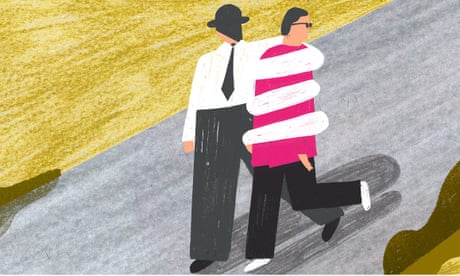By all counts and measures, Bradley Smith is an unequivocal business success. He's CEO of Rescue One Financial, an Irvine, California-based financial services company that had sales of nearly $32 million last year. Smith's company has grown some 1,400 percent in the last three years, landing it at No. 310 on this year's Inc. 500. So you might never guess that just five years ago, Smith was on the brink of financial ruin--and mental collapse.
Back in 2008, Smith was working long hours counseling nervous clients about getting out of debt. But his calm demeanor masked a secret: He shared their fears. Like them, Smith was sinking deeper and deeper into debt. He had driven himself far into the red starting--of all things--a debt-settlement company. "I was hearing how depressed and strung out my clients were, but in the back of my mind I was thinking to myself, I've got twice as much debt as you do," Smith recalls.
He had cashed in his 401(k) and maxed out a $60,000 line of credit. He had sold the Rolex he bought with his first-ever paycheck during an earlier career as a stockbroker. And he had humbled himself before his father--the man who raised him on maxims such as "money doesn't grow on trees" and "never do business with family"--by asking for $10,000, which he received at 5 percent interest after signing a promissory note.
Smith projected optimism to his co-founders and 10 employees, but his nerves were shot. "My wife and I would share a bottle of $5 wine for dinner and just kind of look at each other," Smith says. "We knew we were close to the edge." Then the pressure got worse: The couple learned they were expecting their first child. "There were sleepless nights, staring at the ceiling," Smith recalls. "I'd wake up at 4 in the morning with my mind racing, thinking about this and that, not being able to shut it off, wondering, When is this thing going to turn?" After eight months of constant anxiety, Smith's company finally began making money.
Successful entrepreneurs achieve hero status in our culture. We idolize the Mark Zuckerbergs and the Elon Musks. And we celebrate the blazingly fast growth of the Inc. 500 companies. But many of those entrepreneurs, like Smith, harbor secret demons: Before they made it big, they struggled through moments of near-debilitating anxiety and despair--times when it seemed everything might crumble.

"It's like a man riding a lion. People think, 'This guy's brave.' And he's thinking, 'How the hell did I get on a lion, and how do I keep from getting eaten?"
Until recently, admitting such sentiments was taboo. Rather than showing vulnerability, business leaders have practiced what social psychiatrists call impression management--also known as "fake it till you make it." Toby Thomas, CEO of EnSite Solutions (No. 188 on the Inc. 500), explains the phenomenon with his favorite analogy: a man riding a lion. "People look at him and think, This guy's really got it together! He's brave!" says Thomas. "And the man riding the lion is thinking, How the hell did I get on a lion, and how do I keep from getting eaten?"
Not everyone who walks through darkness makes it out. In January, well-known founder Jody Sherman, 47, of the e-commerce site Ecomom took his own life. His death shook the start-up community. It also reignited a discussion about entrepreneurship and mental health that began two years earlier after the suicide of Ilya Zhitomirskiy, the 22-year-old co-founder of Diaspora, a social networking site.
Lately, more entrepreneurs have begun speaking out about their internal struggles in an attempt to combat the stigma on depression and anxiety that makes it hard for sufferers to seek help. In a deeply personal post called "When Death Feels Like a Good Option," Ben Huh, the CEO of the Cheezburger Network humor websites, wrote about his suicidal thoughts following a failed start-up in 2001. Sean Percival, a former MySpace vice president and co-founder of the children's clothing start-up Wittlebee, penned a piece called "When It's Not All Good, Ask for Help" on his website. "I was to the edge and back a few times this past year with my business and own depression," he wrote. "If you're about to lose it, please contact me."
Brad Feld, a managing director of the Foundry Group, started blogging in October about his latest episode of depression. The problem wasn't new--the prominent venture capitalist had struggled with mood disorders throughout his adult life--and he didn't expect much of a response. But then came the emails. Hundreds of them. Many were from entrepreneurs who had also wrestled with anxiety and despair. (For more of Feld's thoughts on depression, see his column, "Surviving the Dark Nights of the Soul," in Inc.'s July/August issue.)"If you saw the list of names, it would surprise you a great deal," says Feld. "They are very successful people, very visible, very charismatic-;yet they've struggled with this silently. There's a sense that they can't talk about it, that it's a weakness or a shame or something. They feel like they're hiding, which makes the whole thing worse."
If you run a business, that probably all sounds familiar. It's a stressful job that can create emotional turbulence. For starters, there's the high risk of failure. Three out of four venture-backed start-ups fail, according to research by Shikhar Ghosh, a Harvard Business School lecturer. Ghosh also found that more than 95 percent of start-ups fall short of their initial projections.
Entrepreneurs often juggle many roles and face countless setbacks--lost customers, disputes with partners, increased competition, staffing problems--all while struggling to make payroll. "There are traumatic events all the way along the line," says psychiatrist and former entrepreneur Michael A. Freeman, who is researching mental health and entrepreneurship.
Complicating matters, new entrepreneurs often make themselves less resilient by neglecting their health. They eat too much or too little. They don't get enough sleep. They fail to exercise. "You can get into a start-up mode, where you push yourself and abuse your body," Freeman says. "That can trigger mood vulnerability."
So it should come as little surprise that entrepreneurs experience more anxiety than employees. In the latest Gallup-Healthways Well-Being Index, 34 percent of entrepreneurs--4 percentage points more than other workers--reported they were worried. And 45 percent of entrepreneurs said they were stressed, 3 percentage points more than other workers.
But it may be more than a stressful job that pushes some founders over the edge. According to researchers, many entrepreneurs share innate character traits that make them more vulnerable to mood swings. "People who are on the energetic, motivated, and creative side are both more likely to be entrepreneurial and more likely to have strong emotional states," says Freeman. Those states may include depression, despair, hopelessness, worthlessness, loss of motivation, and suicidal thinking.

Call it the downside of being up. The same passionate dispositions that drive founders heedlessly toward success can sometimes consume them. Business owners are "vulnerable to the dark side of obsession," suggest researchers from the Swinburne University of Technology in Melbourne, Australia. They conducted interviews with founders for a study about entrepreneurial passion. The researchers found that many subjects displayed signs of clinical obsession, including strong feelings of distress and anxiety, which have "the potential to lead to impaired functioning," they wrote in a paper published in the Entrepreneurship Research Journal in April.
Reinforcing that message is John Gartner, a practicing psychologist who teaches at Johns Hopkins University Medical School. In his book The Hypomanic Edge: The Link Between (a Little) Craziness and (a Lot of) Success in America, Gartner argues that an often-overlooked temperament--hypomania--may be responsible for some entrepreneurs' strengths as well as their flaws.
A milder version of mania, hypomania often occurs in the relatives of manic-depressives and affects an estimated 5 percent to 10 percent of Americans. "If you're manic, you think you're Jesus," says Gartner. "If you're hypomanic, you think you're God's gift to technology investing. We're talking about different levels of grandiosity but the same symptoms."
Gartner theorizes that there are so many hypomanics--and so many entrepreneurs--in the U.S. because our country's national character rose on waves of immigration. "We're a self-selected population," he says. "Immigrants have unusual ambition, energy, drive, and risk tolerance, which lets them take a chance on moving for a better opportunity. These are biologically based temperament traits. If you seed an entire continent with them, you're going to get a nation of entrepreneurs."
Though driven and innovative, hypomanics are at much higher risk for depression than the general population, notes Gartner. Failure can spark these depressive episodes, of course, but so can anything that slows a hypomanic's momentum. "They're like border collies--they have to run," says Gartner. "If you keep them inside, they chew up the furniture. They go crazy; they just pace around. That's what hypomanics do. They need to be busy, active, overworking."
"Entrepreneurs have struggled silently. There's a sense that they can't talk about it, that it's a weakness."
No matter what your psychological makeup, big setbacks in your business can knock you flat. Even experienced entrepreneurs have had the rug pulled out from under them. Mark Woeppel launched Pinnacle Strategies, a management consulting firm, in 1992. In 2009, his phone stopped ringing.
Caught in the global financial crisis, his customers were suddenly more concerned with survival than with boosting their output. Sales plummeted 75 percent. Woeppel laid off his half-dozen employees. Before long, he had exhausted his assets: cars, jewelry, anything that could go. His supply of confidence was dwindling, too. "As CEO, you have this self-image--you're the master of the universe," he says. "Then all of a sudden, you are not."
Woeppel stopped leaving his house. Anxious and low on self-esteem, he started eating too much--and put on 50 pounds. Sometimes he sought temporary relief in an old addiction: playing the guitar. Locked in a room, he practiced solos by Stevie Ray Vaughan and Chet Atkins. "It was something I could do just for the love of doing it," he recalls. "Then there was nothing but me, the guitar, and the peace."
Through it all, he kept working to develop new services. He just hoped his company would hang on long enough to sell them. In 2010, customers started to return. Pinnacle scored its biggest-ever contract, with an aerospace manufacturer, on the basis of a white paper Woeppel had written during the downturn. Last year, Pinnacle's revenue hit $7 million. Sales are up more than 5,000 percent since 2009, earning the company a spot at No. 57 on this year's Inc. 500.
Woeppel says he's more resilient now, tempered by tough times. "I used to be like, 'My work is me,' " he says. "Then you fail. And you find out that your kids still love you. Your wife still loves you. Your dog still loves you."
But for many entrepreneurs, the battle wounds never fully heal. That was the case for John Pope, CEO of WellDog, a Laramie, Wyoming-based energy technology firm. On Dec. 11, 2002, Pope had exactly $8.42 in the bank. He was 90 days late on his car payment. He was 75 days behind on the mortgage. The IRS had filed a lien against him. His home phone, cell phone, and cable TV had all been turned off. In less than a week, the natural-gas company was scheduled to suspend service to the house he shared with his wife and daughters. Then there would be no heat. His company was expecting a wire transfer from the oil company Shell, a strategic investor, after months of negotiations had ended with a signed 380-page contract. So Pope waited.
The wire arrived the next day. Pope--along with his company--was saved. Afterward, he made a list of all the ways in which he had financially overreached. "I'm going to remember this," he recalls thinking. "It's the farthest I'm willing to go."
Since then, WellDog has taken off: In the past three years, sales grew more than 3,700 percent, to $8 million, making the company No. 89 on the Inc. 500. But emotional residue from the years of tumult still lingers. "There's always that feeling of being overextended, of never being able to relax," says Pope. "You end up with a serious confidence problem. You feel like every time you build up security, something happens to take it away."
Pope sometimes catches himself emotionally overreacting to small things. It's a behavior pattern that reminds him of posttraumatic stress disorder. "Something happens, and you freak out about it," he says. "But the scale of the problem is a lot less than the scale of your emotional reaction. That just comes with the scar tissue of going through these things."
"If you're manic, you think you're Jesus. If you're hypomanic, you think you're God's gift to technology investing."John Gartner
Though launching a company will always be a wild ride, full of ups and downs, there are things entrepreneurs can do to help keep their lives from spiraling out of control, say experts. Most important, make time for your loved ones, suggests Freeman. "Don't let your business squeeze out your connections with human beings," he says. When it comes to fighting off depression, relationships with friends and family can be powerful weapons. And don't be afraid to ask for help--see a mental health professional if you are experiencing symptoms of significant anxiety, posttraumatic stress disorder, or depression.
Freeman also advises that entrepreneurs limit their financial exposure. When it comes to assessing risk, entrepreneurs' blind spots are often big enough to drive a Mack truck through, he says. The consequences can rock not only your bank account but also your stress levels. So set a limit for how much of your own money you're prepared to invest. And don't let friends and family kick in more than they can afford to lose.
Cardiovascular exercise, a healthful diet, and adequate sleep all help, too. So does cultivating an identity apart from your company. "Build a life centered on the belief that self-worth is not the same as net worth," says Freeman. "Other dimensions of your life should be part of your identity." Whether you're raising a family, sitting on the board of a local charity, building model rockets in the backyard, or going swing dancing on weekends, it's important to feel successful in areas unrelated to work.
The ability to reframe failure and loss can also help leaders maintain good mental health. "Instead of telling yourself, 'I failed, the business failed, I'm a loser,' " says Freeman, "look at the data from a different perspective: Nothing ventured, nothing gained. Life is a constant process of trial and error. Don't exaggerate the experience."
Last, be open about your feelings--don't mask your emotions, even at the office, suggests Brad Feld. When you are willing to be emotionally honest, he says, you can connect more deeply with the people around you. "When you deny yourself and you deny what you're about, people can see through that," says Feld. "Willingness to be vulnerable is very powerful for a leader."


 ‘When one person is stonewalling, the person being stonewalled may try to trigger a row in order to get a reaction’ (photograph posed by models). Photograph: JackF/Getty Images/iStockphoto
‘When one person is stonewalling, the person being stonewalled may try to trigger a row in order to get a reaction’ (photograph posed by models). Photograph: JackF/Getty Images/iStockphoto






